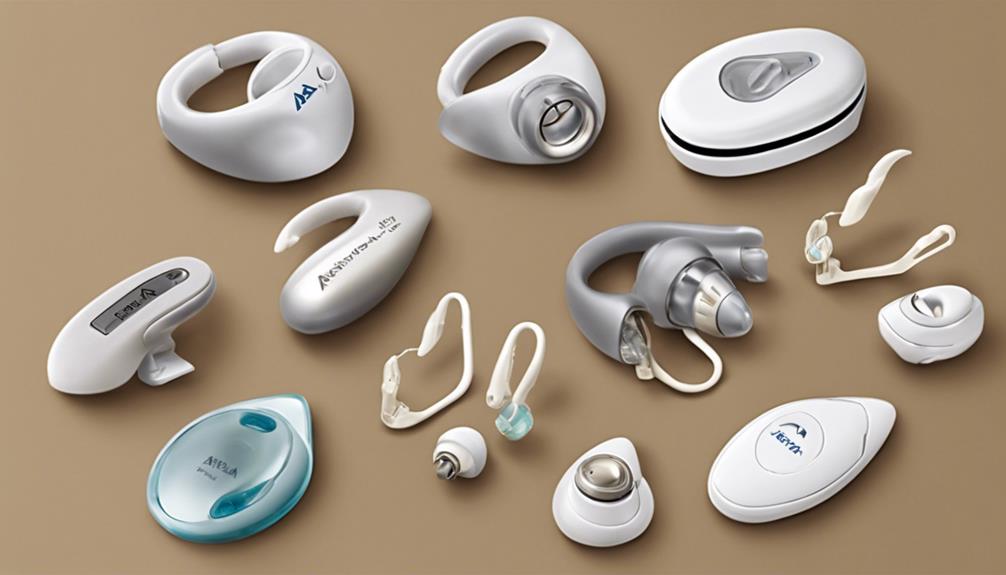Have you ever wondered what Aetna’s coverage for hearing aids really entails? Let’s explore the specifics together.
From eligibility requirements to the types of hearing aids covered and the nitty-gritty of costs and processes, our guide will shed light on it all.
Stay tuned to uncover the ins and outs of Aetna's comprehensive approach to hearing aid coverage, because understanding these details could make a significant difference in your healthcare journey.
Key Takeaways
- Aetna's coverage includes various types of hearing aids to cater to individual needs.
- Understanding eligibility criteria, cost details, and the process is essential for obtaining coverage.
- Aetna offers support resources and assistance to help members navigate the coverage process effectively.
- Comparing Aetna plans and confirming coverage specifics are crucial steps in accessing hearing aid benefits.
Eligibility Requirements for Hearing Aid Coverage
To determine eligibility for hearing aid coverage under Aetna, individuals may need to provide a physician's referral for certain plans. Aetna's eligibility requirements for hearing aid coverage can involve specific criteria, such as a documented hearing loss, to qualify for benefits under their plans.
It's important to understand that eligibility for hearing aid coverage with Aetna may vary based on individual policy terms, state variations, and the specific Aetna plan one is enrolled in. Additionally, there may be limitations on the number of replacements allowed or the types of hearing aids covered under certain Aetna plans.
Being aware of these factors is crucial in determining if one meets the necessary criteria to receive coverage for hearing aids through Aetna. By familiarizing oneself with the eligibility requirements and limitations set by Aetna, individuals can navigate the process more effectively and ensure they receive the appropriate coverage for their hearing needs.
Types of Hearing Aids Covered by Aetna

Aetna's coverage extends to various types of hearing aids, encompassing in-the-ear (ITE), behind-the-ear (BTE), receiver-in-canal (RIC), completely-in-canal (CIC), and invisible-in-canal (IIC) models. The coverage for specific types of hearing aids may vary depending on the Aetna plan and individual needs.
Aetna typically includes coverage for both traditional and advanced styles of hearing aids to address diverse hearing loss requirements. Different types of hearing aids offer varying levels of discretion, comfort, and functionality, catering to individual preferences and lifestyle.
Understanding the differences and benefits of each type of hearing aid is crucial in making informed decisions about one's hearing health care. By considering factors such as size, visibility, and features, individuals can select the most suitable hearing aid that aligns with their unique needs and enhances their quality of life.
Aetna aims to provide a comprehensive range of options to ensure that individuals receive appropriate hearing aid solutions tailored to their specific requirements.
Cost and Coverage Details for Aetna Plans
When exploring Aetna plans, the cost and coverage details for hearing aids play a crucial role in decision-making. Many Aetna Medicare Advantage plans offering hearing aid coverage come with $0 premiums, like the Aetna Medicare Assure Plan that has no premium or medical deductible. It's essential to note that the annual out-of-pocket maximum for this plan is $7,550, providing financial protection for individuals requiring extensive care.
However, it's important to remember that plan costs and benefits can vary based on location. To ensure you find the most suitable coverage for hearing aids, comparing different Aetna plans becomes imperative. By evaluating factors such as premiums, out-of-pocket maximums, and specific coverage details, individuals can make informed decisions that align with their healthcare needs.
Taking the time to compare plans can lead to selecting an Aetna plan that not only provides comprehensive hearing aid coverage but also meets other healthcare requirements effectively.
Process for Obtaining Hearing Aids Through Aetna

Exploring Aetna plans for hearing aids involves confirming coverage with your specific plan before proceeding with the process to obtain them. To ensure a smooth experience, here are four essential steps to follow:
- Check Your Insurance: Review your Aetna benefit plans to determine if you're eligible for hearing aid coverage.
- Consult with Healthcare Providers: Seek a physician's referral if required by Aetna or to meet specific criteria for hearing aid coverage.
- Complete Necessary Paperwork: Fill out any required forms and agreements as part of the process for obtaining hearing aids through Aetna.
- Select and Fit Hearing Aids: Choose suitable hearing aids based on your hearing needs and preferences, and follow up with Aetna-approved providers for fitting and adjustments.
Additional Resources and Support for Aetna Members
Accessing additional resources and support for Aetna members seeking coverage for hearing aids is facilitated through various channels.
Aetna offers a range of aids available through their insurance benefits, including detailed information accessible on their online portal specifically addressing coverage for hearing aids.
Members can benefit from dedicated customer service representatives who are available to assist with inquiries related to hearing aid coverage. Additionally, Aetna may provide educational materials or guides to aid members in understanding the process of getting their hearing aids covered.
For further assistance, members can inquire about support services, such as help in finding in-network providers for hearing aid services.
Frequently Asked Questions
How Often Does Aetna Pay for Hearing Aids?
We pay for hearing aids every 3-5 years based on our plan specifics. The replacement frequency depends on our benefits and requirements.
Our coverage includes evaluation, fitting, and maintenance over a specific timeframe. Members should review their plan details to understand the frequency of hearing aid coverage provided.
How Come Hearing Aids Are Not Covered by Insurance?
We understand that hearing aids not being covered by insurance can be frustrating. Insurance companies often categorize them as elective rather than essential, leading to inconsistent coverage. Due to high costs, some plans exclude hearing aids.
Limited awareness of hearing loss impact may also play a role. It's important to advocate for better coverage to ensure everyone has access to necessary medical devices for improved quality of life.
What Is Covered in the Cost of the Hearing Aids?
When it comes to the cost of hearing aids, Aetna typically covers the devices themselves as well as related services like adjustments and maintenance. Understanding these inclusions can help us plan for our hearing healthcare expenses.
It's important to note that coverage may vary depending on the specific plan and state regulations. By checking our plan's benefits, we can ensure we make informed decisions about our hearing aid coverage under Aetna.
What Is the Threshold for Hearing Aids?
We determine the threshold for hearing aids based on the level of hearing loss. This threshold is established through a comprehensive audiologic evaluation. Criteria set by insurance providers like Aetna may also play a role in this determination.
People with significant hearing loss beyond this threshold can benefit from using hearing aids. The process typically involves audiometric testing and assessing communication difficulties to ensure the most suitable solution for the individual.
Conclusion
As we've delved into the intricate world of how Aetna covers hearing aids, one can't help but wonder what other innovative solutions and benefits this partnership holds.
Stay tuned for future updates on potential advancements and enhancements in hearing aid coverage. The journey to improved hearing and quality of life continues with Aetna by our side.
Keep your ears open for exciting developments on the horizon.











